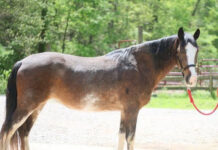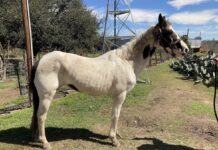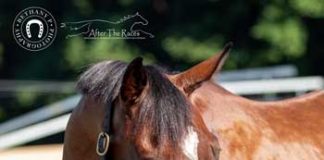
In Oakland, Oregon, the 1,120 acre Duchess Sanctuary is home to 196 horses and donkeys rescued from public lands, slaughter, the pharmaceutical industry, and other horrific situations.
Like humans, the needs of horses change as they age. The average life expectancy for horses is 25-30 years, and donkeys can live past 40. As a sanctuary dedicated to providing lifetime care, the staff at Duchess handles those changes every day, meeting the considerable emotional and physical needs of an aging population with individual care plans and great attention to detail.
Our feed list is a two-page long spreadsheet specifying feed, supplements, medications, and care instructions for each horse or donkey receiving any feed other than a standard hay ration. A staff member observes every animal daily, ensuring that we catch changes in health or attitude promptly.
Dental Care
It may surprise people to learn that dental issues are often the first challenge horses face as they age. Teeth wear down while pushing up through the jaw bone over a horse’s lifetime as their grinding surface is worn down through chewing. Eventually, there is little tooth root left and they fall out or require extraction, compromising the animal’s ability to process their feed efficiently, and increasing their risk of digestive troubles. A diet adjustment can alleviate this issue, so we replace hay and dry grains with soaked feeds in order for our elderly horses to eat in comfort. We feed more than ten tons of alfalfa pellets every year, almost all of which is soaked mash for our seniors or other special needs animals.
More frequent dental exams by a veterinarian become essential for seniors. Every horse over the age of 15 has had a thorough veterinary dental exam and been placed on an individual maintenance schedule. “Dental days” that occur multiple times per year will have our contracted veterinarians peering into the mouths of one horse after another, as many as twenty being treated each day. But even with dental care, seniors are not as efficient as younger horses at absorbing nutrients, and they will naturally lose muscle tone as they age, so supplements, particularly vitamins and balanced amino acids, are often required to keep them at a good weight.
Safe Feeding
Competition for food can also be a problem when it comes to caring for nearly 200 horses, so a protected area for older horses to eat in peace at their leisure without others running them off is essential. At the sanctuary, many of our enclosures have feed pens just for this purpose.

Weathering the Cold
Senior horses can have trouble regulating their body temperatures, and some are particularly sensitive to the cold. Shelter from the weather is essential for all horses, but especially any compromised by age or illness. Winter blankets or rain sheets help keep some of our more fragile residents warm and dry during Oregon’s cold rainy season, usually from November through March.
Joint Health and Soundness
Arthritis and other joint issues are common ailments facing our older horses, and we see a lot of this especially in our mares rescued from the Pregnant Mare Urine (PMU) industry. They spent year after year pregnant, confined to narrow tie stalls, standing on hard, unforgiving floors while their urine was collected to make hormone replacement drugs for women. For an animal who evolved to be in constant motion for skeletal, digestive, and mental health, being unable to move more than a few steps was exceptionally hard on them. Pregnant mares were rarely able to lie down comfortably in those tiny stalls, compounding the effect on their legs and joints. It is a stark contrast to the their current lives at the Duchess Sanctuary where they are free to roam at will over the hills, nap and roll in the grass, interact with their herd members, and are forever protected from suffering.
Mobility challenges also mean horses will fall to the bottom of the hierarchy in a herd, and struggle to keep up traveling distances, especially if hills are involved. Removing them from the rambunctious general populations that roam our hills and designating smaller, flat areas with adequate shelter is important. One group of older mares grazes with the main herd during the spring and summer, but moves into their own pasture for the winter. We have a year-round “Old Lady” pasture for another group of senior mares, as well as other elders housed in various paddocks throughout the farm.

Horse, equine, donkey, Duchess, rescue, sanctuary, mustang. BLM, PMU, Premarin
Senior Health Care
Eyesight, skin sensitivity, and mental acuity are just a few of the other critical issues that can also deteriorate as horses age, so special attention has to be paid while grooming and handling them. And the staff at Duchess is up for the task.
The typical progression as a horse ages here is first removal from the main herd during the winter for supplemental feeding, transitioning to year round life in a designated pasture, then to additional special needs care in a paddock or stall. Each animal is treated as the individual that they are, with respect given to their family and friendship bonds.
This carefully-designed graduated care system allows us to ensure that all of our deserving horses and donkeys are as happy and comfortable as we can make them during their “golden years.” While we cannot erase the suffering and trauma they faced in the past, we can ensure it will never happen again.
Established in 2008, The Duchess Sanctuary is operated by The Fund for Animals in partnership with The Humane Society of the United States.






